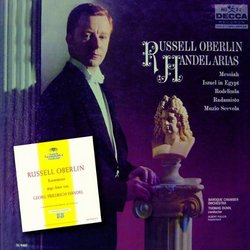A Unique Voice From The Past
Miz Ellen | Bovine Universe | 12/06/2008
(5 out of 5 stars)
"Russell Oberlin's distinctive voice singing these Handel arias for alto voice is like a flash of light illuminating these Baroque treasures. Listening to him sing one can approach, from a different angle, what the audiences of Handel's own time heard when this music was performed.
Most countertenors (and some rock and pop stars) produce their high tones by using a technique known as "falsetto". Oberlin was a classically trained singer with a naturally high tenor voice and astonishing command of it. His voice can sound harsh to fans of Daniels, Scholl or Jaroussky, but once one gets over the shock, one falls in love with it. There's a gritty masculine edge in the upper register, despite the lightness, and he can underline it by dipping into dark deeper tones. It's sexy. Perhaps it is fortunate that I never heard this singer perform live--one is not supposed to throw one's underwear onstage in classical music.
But beyond that, Oberlin's interpretation of the alto parts of the Messiah or Israel in Egypt is intelligent, expressive and thought-provoking. He does it differently and beautifully and his version seems absolutely right without making any of the other interpreters wrong. They just couldn't do it like that if they tried. Regretfully, this CD is only about 47 minutes long--it comes from a "long play" record released in 1960 when Oberlin would have been 32 and at the height of his prowess as a singer. The sound one hears when the music stops is the ghost of GF Handel, applauding."
Higher and higher
Alec Beattie | Australia | 05/21/2008
(5 out of 5 stars)
"Oberlin's voice truly has a tone color unlike any other singer I have ever heard. His clear enunciation, massive range and excellent choice of repertoire make this album a must-have for those with an interest in uniquely high male voices such as the American Michael Maniaci.
This album also provides food for thought for the debate that has surrounded the use of the term "countertenor". It has been a subject of much debate whether Oberlin himself used a "chest voice" "mixed voice" or "falsetto voice" to sing.
When listening to this album, I suggest taking no judgement on the technique used by Oberlin to produce his voice, but simply listening to the pleasant singing that he has recorded.
A. Beattie 2008"

